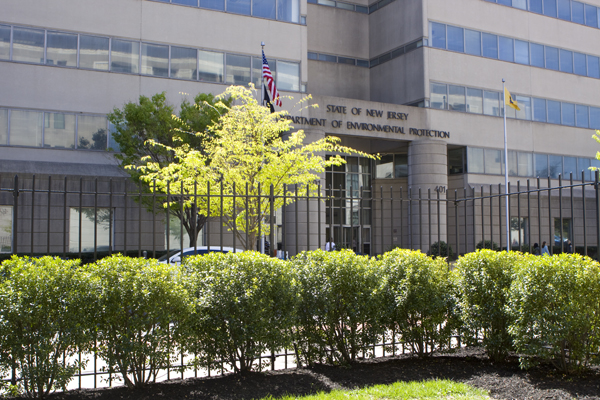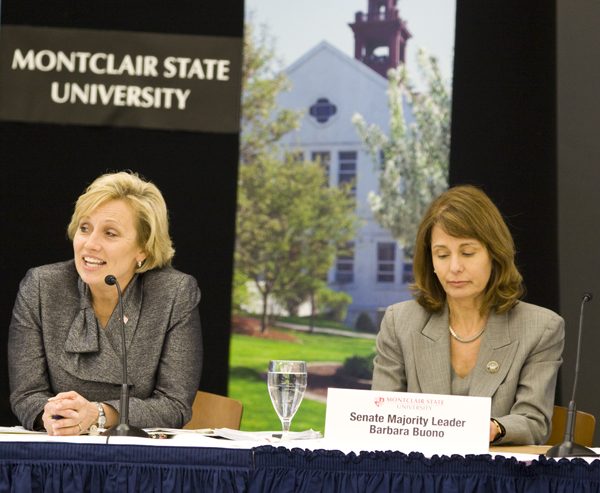Christie’s Earth Week: Day 1 – Red Tape Rollback

DEP HQ - Trenton, NJ
[Update: Philadelphia Inquirer: Red-tape panel has no easy answers – the claim that environmental groups had mixed reactions is not accurate, unless an off the record source offered a favorable assessment that was not reported in the story]
Today is the 40th anniversary of the creation of the Department of Environmental Protection. [Error – it is April 22, sorry!] More on that tomorrow.
For now, I could say this was adding insult to injury, but let’s just call it DEP’s mid life crisis. News from PEER:
For Immediate Release: Tuesday, April 20, 2010
Contact:Â Bill Wolfe (609) 397-4861; Kirsten Stade (202) 265-7337
CHRISTIE TO AXE JERSEY POLLUTION AND PUBLIC HEALTH RULES
“Red Tape Review Group” Issues Hit List of Regulations to Toss or Water Down
Trenton – A panel commissioned by Governor Chris Christie recommends that New Jersey jettison an array of anti-pollution, public health and smart growth rules in order to attract businesses and jobs to the Garden State. The rules targeted for repeal or revision would weaken current standards for air and water pollution, flood hazard reduction, protecting the Highlands, toxic site clean-up and even preventing toxic catastrophes, according to Public Employees for Environmental Responsibility (PEER).
On his first day in office, Gov. Christie issued a series of sweeping Executive Orders one of which established a “Red Tape Review” group under the Lt. Governor to examine all existing regulations. He also imposed a 90-day moratorium on 160 pending proposed rules, 12 of which emanated from the Department of Environmental Protection (DEP). The moratorium expires today and yesterday the Red Tape Review Group released its recommendations.
Citing the need to streamline bureaucracy and promote economic development, the Red Tape report calls for regulatory relief from a score of existing DEP regulations, including:
- Water Quality Management rules which prohibit sewer line extensions into environmentally sensitive areas such as forests, stream buffers, and endangered species habitat;
- Rules to protect the New Jersey Highlands, a region of 800,000 acres that provides water supply to over 5 million state residents, from degradation due to over-development;
- Stream buffers protections and flood hazard reduction regulations;
- Strict oversight of toxic site clean-ups managed by private consultants, under a new privatized site remediation plan enacted under Gov. Corzine;
- Coastal zone management protections, including public access rules;
- Air pollution control to allow wider variances for exceeding permit limits; and
- Relaxing rules under the Toxic Catastrophe Prevention Act to prevent a repeat of the disaster at a Dow Chemical plant in Bhopal, India, where 7,000 people died from poison fumes. The report cites compliance costs to industry and questions the need for any rules beyond a federal minimum.
“This Red Tape report represents a radical assault on longstanding strict protections of New Jersey’s air, water, land and natural resources,” stated New Jersey PEER Director Bill Wolfe, a former DEP analyst, noting that the report lacks any factual basis for declaring listed protections as less than cost beneficial. “Under the guise of a ‘common sense regulation,’ the Christie folks have compiled a polluters’ wish list.”
Gov. Christie has embraced the Red Tape Review report. The next step will be for the DEP to begin formal rulemaking on each targeted regulation with either a complete repeal or specified alterations. New regulations will be viewed through a new cost benefit analysis and a desire to eliminate any state level requirements above required by federal mandates.
“Governor Christie wants to adopt the same hands-off approach to protecting the environment employed by states like Louisiana, which is not a model we want to emulate” Wolfe added. “More pollutions, dirtier rivers and terrible sprawl are not the building blocks of a sane economic strategy for New Jersey.”
###
Read the environmental recommendations of the Red Tape Review report
Look at the damage from Christie’s regulatory moratorium
See the abandonment of the state climate change efforts
View the entire Red Tape Review Group report
New Jersey PEER is a state chapter of a national alliance of state and federal agency resource professionals working to ensure environmental ethics and government accountability






